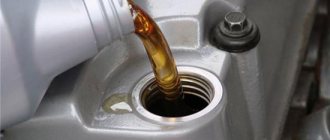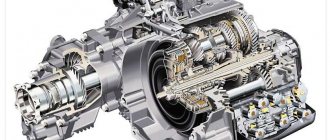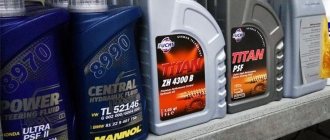Probably every car enthusiast is interested in knowing the difference between working lubricants, which must be periodically poured into diesel and gasoline power units. It seems that the principle of operation is the same for both - both are internal combustion engines. In both cases, it is necessary to minimize friction between components and parts and remove combustion products. In fact, everything is much more complicated than it seems at first glance.
Diesel engine features
What is the difference between a diesel engine and a gasoline engine? The first thing I would like to note is that in the piston group of diesel engines, to create conditions for fuel ignition, a high level of compression is created. Accordingly, the operating temperature is also high. These harsh conditions create the potential for parts to overheat. In addition, such a motor does not require high speeds in order to obtain maximum torque output. Diesel fuel ignites in the combustion chamber not from a spark of a candle, but from the created pressure. Such a fire leaves behind more residual products - such as carbon deposits, soot and other deposits.
It can be argued that this mode of operation activates oxidative processes on the metal surfaces of parts. In addition, the high level of compression makes it possible for some of the exhaust gases to penetrate into the crankcase of the power unit. Exhaust gases also provoke oxidation processes on the oil surface. If the lubricant cannot withstand such chemical aggression, the engine will quickly fail.
Diesel fuel has one more feature compared to gasoline - its composition contains more sulfur. During combustion, chemical reactions occur, which result in the formation of sulfur oxides. These are aggressive materials that provoke chemical reactions. Oxidative processes are also facilitated by the large amount of air used during combustion.
All of the above features lead to the fact that scheduled maintenance and replacement of air filters for diesel engines is carried out more often than for gasoline units. A diesel engine is exposed to a greater number of threats throughout its operation. Therefore, diesel oil must simultaneously:
- neutralize oxidative reactions;
- adsorb soot and carbon deposits, preventing them from settling on the surfaces of parts;
- function normally at high pressures and temperatures.
Let's compare the operation of the motors
To better understand why the oil of one engine is not suitable for another, let’s figure out what characteristics they have that differ:
- A diesel engine has a higher degree of mixture compression (in some models it is almost twice the compression of a gasoline engine), which makes its pistons and cylinders more susceptible to overheating (according to scientific theory, a diesel engine is a “heat-stressed engine”).
- In addition, it has a lower revving speed; diesel engines whose revs reach 5000 per minute are rare. It is also important to note that the ignition of the mixture occurs from strong compression, not from a spark from the spark plugs; it often happens that the fuel (at least a little) does not burn out completely.
- A gasoline engine has a lower compression ratio and the temperature inside the cylinders is much lower. If we take into account turbocharged (equipped with an air turbine) engines, they are generally considered cold-blooded, because in winter it is very difficult to warm them up to high temperatures.
- In a gasoline engine, the revolutions are simply prohibitive for diesel engines; the engine can be accelerated to 9000 rpm, and if you slightly pump it up, you will get 10 - 12 thousand revolutions. Here the mixture is ignited by spark plugs, they provide the spark that ignites the fuel. Fuel combustion in the gasoline version is more complete.
Differences between oils for passenger cars and diesel trucks
These differences are caused by the design features of engines, as well as their operating modes in trucks and passenger cars. Power units of passenger cars are capable of developing higher speeds, which leaves its mark on the quality properties of motor oil. Trucks have more powerful power units. A higher pressure is formed in their combustion chambers, a larger amount of diesel fuel is consumed - accordingly, there are more deposits and soot.
Lubricants for diesel trucks contain more alkaline compounds, as well as more additives that adsorb combustion products. The duration of their operation is longer, that is, when operating passenger cars, oil changes are carried out more often.
Based on the above, we can say the following: it is not recommended to pour truck oil into a passenger car; it is not designed for such speeds. Also, you cannot pour lubricant for passenger cars into trucks. If you do this, it will only be in a hopeless situation. At the first opportunity, you need to change the working fluid to a more suitable one so that the engine oil meets the car manufacturer’s tolerances.
Distinctive features of gasoline engines
If we compare the compression ratio in the combustion chambers of diesel engines with gasoline engines, it is significantly lower in the latter. This means that the temperature loads on the gasoline power unit are also lower. At the same time, to obtain optimal torque, these engines require higher speeds - they can reach 8-9 thousand. The fuel mixture is ignited by sparks from the spark plugs. This ignition method causes the fuel to burn more completely and quickly, so less combustion residual products are released than with diesel units.
At first glance, it seems that if you can get more revolutions on a gasoline engine, then the oil for it should be thinner. Actually this is not true. The degree of viscosity is comparable, since many identical additives are added to the base oil. It is viscous compositions that make it possible to create a more stable protective film on the surfaces of parts. But the lubricant composition for gasoline units contains fewer alkaline compounds. We can conclude that the oil for injection units is simpler in composition. If the temperature conditions and pressure in which it is used are not so severe, this means that the requirements for its composition and additives are more moderate.
Operating principles of both types of engines
It would seem that in both cases the oil performs the same lubricating function. But we should start considering the issue with what is the fundamental difference between a gasoline engine and a diesel engine. The latest power unit is characterized by a higher rate of processes occurring in it, in particular, this concerns oxidation. The diesel fuel itself does not completely burn out, and after it there remains a lot of unburnt products, such as soot, deposits, soot, etc. The incoming exhaust gases also contribute to the rapid oxidation of the lubricant.
To understand whether a particular type of oil is suitable for radically different types of power units, you need to understand the features of their functioning. The operation of diesel engines is associated with a regime of significant thermal stress. The formation of the working mixture and its combustion occurs much faster in them. In addition, you can dwell on the following characteristics of their functioning:
- diesel fuel emits much more soot when burned;
- it contains sulfur, which leads to the formation of oxides that negatively affect the operation of various engine elements;
- soot and soot settle on the walls and heavily pollute the power unit.
Individual parts, such as rings and pistons, are subject to high mechanical and thermal stress. Let's add to this that the diesel engine has twice the compression ratio. During the combustion of the fuel-forming mixture, abundant formation of soot occurs, which must be washed out with diesel oil specially designed for this purpose.
Diesel oil in a gasoline engine
What happens if you pour diesel oil into a gasoline engine? We can say that at first nothing bad will happen. But we should immediately make a reservation - lubricants for truck diesel engines are not suitable for such experiments due to the high content of alkaline components and ash content. If you pour it, then only for passenger engines.
Diesel oils contain up to 15% additives for various purposes, unlike gasoline oils, in which this figure is at the level of 5%. Here the difference is noticeable. We can say that the cleaning and antioxidant properties of diesel compounds are better. This is confirmed by reports from car owners who undertook such a risky experiment. They claim that, for example, when disassembling the gas distribution mechanism, it looks like new.
There is one “but”: with such a lubricant, you cannot give a gasoline engine high speeds. Such experiments are contraindicated for the Schumachers. After all, diesel working fluid is not designed for high speeds. It is necessary to drive according to the rules, without making sudden overtaking and not allowing the engine to develop more than 4.5 thousand revolutions - then there may be no negative consequences.
All these experiments could be understandable if there were no lubricant for injectors on sale or it would cost much more. In fact, the choice of auto chemicals today is simply huge. You can, after all, purchase a lubricant whose characteristics coincide with those declared by the manufacturer. If you want to improve cleaning or antioxidant properties - please! The appropriate additives are purchased and added to the oil.
Petrol version
Some may think that for high speed gasoline engines, a thinner oil is needed. But this is not entirely true; the characteristics are almost identical to those of the opponent. The thing is that gasoline oils have fewer alkalis in their composition, but the main package of additives may be the same.
Although in fairness, it is worth noting that gasoline oil is a little simpler in composition than diesel oil.
Gasoline lubricant in diesel
If the previous experiment could end successfully, then this one is simply prohibited. Firstly, the temperature regime of a diesel engine is much harsher. The lubricant composition for the injector under such conditions will simply lose its working qualities. Next, the combustion process in these power units occurs differently. Gasoline is a light hydrocarbon, and diesel fuel is a heavy hydrocarbon. Therefore, a spark from a spark plug is enough to ignite the fuel mixture of gasoline.
To ignite diesel fuel, twice the pressure is required, as well as a higher temperature. The combustion process is more protracted. This is why it is difficult for a diesel engine to develop high speeds.
Yes, this is not required - the explosion energy is so great that maximum torque can be obtained at low speeds. At the same time, there are much more impurities in diesel fuel than in gasoline.
While diesel lubricant can adsorb and remove combustion products through oil filters, gasoline oil has more modest such capabilities. This means that over time the engine will become coked. This outcome is extremely undesirable, since the power unit will have to be overhauled. The same fate will befall it in terms of oxidation processes - a lubricant for gasoline units simply will not be able to fully protect diesel.
Universal oils
Recently, more and more universal lubricating fluids have appeared on the market, which can be poured into both diesel engines and injectors. They are distinguished by the precise structuring of the composition - all components are very precisely calculated and dosed. Accordingly, the formula of these oils is clearly verified. These working fluids have only a synthetic base. They comply with all existing standards - API, ACEA and others.
Such qualities indicate that these compounds have not a narrowly targeted, but a complex effect on the engine. That is, they do the following work:
- have an antifriction effect, that is, they reduce friction;
- counteract oxidative processes on metal surfaces of parts;
- remove toxins, carbon deposits and soot, absorbing them and leaving these products in oil filters.
These oils can be poured into both gasoline and diesel units. But they are significantly more expensive than those compounds that have more narrowly targeted applications.











